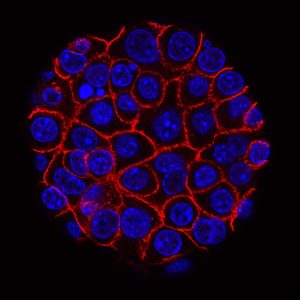
AstraZeneca eyes success in immuno-oncology combinations
pharmafile | May 14, 2015 | News story | Sales and Marketing | ASCO, AZ, AstraZeneca, CTLA-4, MEDI4736
An investigational immuno-oncology drug combination from AstraZeneca has shown promise in its most recent trial, although concerns over its side effects do remain.
Its anti-PD-L1 compound MEDI4736 and CTLA-4 inhibitor tremelimumab in advanced non-small cell lung cancer has shown “evidence in clinical activity, including in PD-L1 negative disease”, according to researchers.
Twenty-six per cent of patients have experienced tumour shrinkage and 35% had stable disease.
However, results released in December 2014 showed that 31% of patients using the medicine had serious adverse events, and treatment was discontinued for 18 per cent. AstraZeneca is planning to present updated data on the safety of the drugs at this year’s ASCO conference in Chicago, US.
The company is keeping a close eye on MEDI4736. Announcing its slate for ASCO, AZ says that the compound shows “durable activity across multiple tumour types and in different combinations”, and touts it as a ‘cornerstone’ for combination treatments in immuno-oncology.
Data from several studies involving MEDI4736 will be presented at the conference this year, along with results for several other drugs.
Drug combinations in immuno-oncology are a top priority for the firm at the moment, as Steve Olsen, head of global oncology affairs, explained in a media briefing last week.
“Because we have medicines that are targeting all these different mechanisms of action, we have the ability to combine different types of agents that are targeting the cancer cells in different ways.
“We know that this works with chemotherapy, that poly-chemotherapy for a lot of diseases is better than single agent chemotherapy. With targeted therapies, we believe it’s the same – and especially by combining things such as drugs that rev-up the immune system with drugs that are targeting the pathways that drive cancer cells to grow.
“We believe that putting these together puts AstraZeneca in a really unique position, because not a lot of companies have the rich pipeline we have, they don’t have the breadth of the types of molecules that we have.”
He added that the company is seeking to be a ‘recognised leader in oncology’ by 2020, with six new immunotherapy molecules released by that point. AstraZeneca currently has 72 trials underway in oncology.
George Underwood
Related Content

AstraZeneca shares results for Imfinzi in phase 3 trial for small cell lung cancer
AstraZeneca has announced positive high-level results from the phase 3 ADRIATIC trial, which demonstrated that …

FDA accepts BLA for AstraZeneca and Daiichi Sankyo’s datopotamab deruxtecan for breast cancer treatment
AstraZeneca and Daiichi Sankyo have announced that their Biologics License Application (BLA) for datopotamab deruxtecan …

FDA approves AstraZeneca’s Ultomiris for NMOSD treatment
AstraZeneca has announced that the US Food and Drug Administration (FDA) has approved Ultomiris (ravulizumab-cwvs) …








